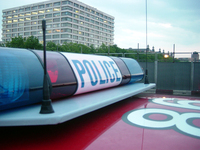 In a 6-1 ruling, the Kansas Supreme Court ruled that criminalizing the refusal of the blood-alcohol test during a traffic stop is unconstitutional. The court found that it violates the 4th Amendment to the United States Constitution prohibiting unreasonable search and seizures by the police during these traffic stops. The Court found that a person has a constitutional right to refuse such searches and not be held criminally liable for refusing the breathalyzer test. This decision could reverberate and cause sweeping reform to DUI laws across the country.
In a 6-1 ruling, the Kansas Supreme Court ruled that criminalizing the refusal of the blood-alcohol test during a traffic stop is unconstitutional. The court found that it violates the 4th Amendment to the United States Constitution prohibiting unreasonable search and seizures by the police during these traffic stops. The Court found that a person has a constitutional right to refuse such searches and not be held criminally liable for refusing the breathalyzer test. This decision could reverberate and cause sweeping reform to DUI laws across the country.
Articles Posted in DUI
The “Affluenza defense”: A Criminal Defense Attorney’s Hail Mary
 As criminal defense lawyers, we’ve all been there. A client with little to no defense while facing serious charges. You reach back into the file, re-read the entire record, and hope something will jump out at you in hopes of something to help your client. I am sure a similar scenario played out for the criminal defense lawyer representing Ethan Couch in Texas several years ago. On June 15, 2013, Couch, 16 years old at the time, was partying and drinking with his teenage friends in Burleston, Texas. He and his friends then decided to leave the house, and Couch opted to drive them in his parents’ pick-up truck to another location across town. Couch was intoxicated and, with about 6 of his friends in the pick-up truck, began speeding on a narrow two lane road. He weaved off the road, and stuck several park cars and plowed into four pedestrians on the sidewalk. All four of the pedestrians were killed and many others seriously injured.
As criminal defense lawyers, we’ve all been there. A client with little to no defense while facing serious charges. You reach back into the file, re-read the entire record, and hope something will jump out at you in hopes of something to help your client. I am sure a similar scenario played out for the criminal defense lawyer representing Ethan Couch in Texas several years ago. On June 15, 2013, Couch, 16 years old at the time, was partying and drinking with his teenage friends in Burleston, Texas. He and his friends then decided to leave the house, and Couch opted to drive them in his parents’ pick-up truck to another location across town. Couch was intoxicated and, with about 6 of his friends in the pick-up truck, began speeding on a narrow two lane road. He weaved off the road, and stuck several park cars and plowed into four pedestrians on the sidewalk. All four of the pedestrians were killed and many others seriously injured.
DUI and The Right of Refusal: The US Supreme Court to Decide
 The United States Supreme decided this past week to hear cases stemming out of North Dakota and Minnesota concerning the constitutionality of criminalizing the refusal of breathalyzer tests. The legal issue in question concerns law enforcement’s potential infringement of the Fourth Amendment right to unreasonable search and seizure under the United States Constitution when police criminalize a suspect for refusing the breath test during a DUI stop. The Supreme Court has ruled in general that the police cannot search a driver or vehicle upon arrest without a warrant unless it is for their own personal safety or to preserve evidence. Challengers to this law look to the Supreme Court’s 2013 decision holding that police could not conduct blood tests without a warrant.
The United States Supreme decided this past week to hear cases stemming out of North Dakota and Minnesota concerning the constitutionality of criminalizing the refusal of breathalyzer tests. The legal issue in question concerns law enforcement’s potential infringement of the Fourth Amendment right to unreasonable search and seizure under the United States Constitution when police criminalize a suspect for refusing the breath test during a DUI stop. The Supreme Court has ruled in general that the police cannot search a driver or vehicle upon arrest without a warrant unless it is for their own personal safety or to preserve evidence. Challengers to this law look to the Supreme Court’s 2013 decision holding that police could not conduct blood tests without a warrant.
Social Media and Your Criminal Case
 Recently, a Floridian woman was live streaming herself driving intoxicated. She says at one point “I’m so drunk” and “let me see if I can make it home without a ticket” on the live stream Periscope App on which other individuals can comment. While on this application, an officer logged on to it and located her car. She then failed the field sobriety test. She was ultimately arrested and given $500 bail.
Recently, a Floridian woman was live streaming herself driving intoxicated. She says at one point “I’m so drunk” and “let me see if I can make it home without a ticket” on the live stream Periscope App on which other individuals can comment. While on this application, an officer logged on to it and located her car. She then failed the field sobriety test. She was ultimately arrested and given $500 bail.
DUI Fatalities: The Ugly Truth and Consequences
![that-hurt-1450455[1]](https://www.pastalaw.com/files/2015/10/that-hurt-14504551.jpg) In recent news, an Illinois man, Joshua Spudich, pled guilty to aggravated driving under the influence and was sentenced to 11 years in prison by Kane County Judge Susan Clancy Boles. In his system, he had a mixture of five different drugs when he got behind the wheel. He then veered out of his driving lane into oncoming traffic striking a motorist which resulted in that victim’s death. Spudich attributed the incident to him taking depression medication prior to him driving. This case highlights the dangers of going behind the wheel while impaired. In representing defendants in DUI cases, the typical case involves a routine traffic stop followed by an officer’s suspicion that the driver is under the influence. That suspicion triggers the officer’s duty to conduct a field sobriety test and then ultimately a breathalyzer to determine the driver’s blood alcohol content. In New Jersey, there are strict guidelines issued by the Office of the Attorney General as to the specific procedures that must be followed in order to ensure that the officers are accurately assessing an individual’s fitness to drive. The end result is often an arrest followed by municipal court charges that result in some form of a license suspension.
In recent news, an Illinois man, Joshua Spudich, pled guilty to aggravated driving under the influence and was sentenced to 11 years in prison by Kane County Judge Susan Clancy Boles. In his system, he had a mixture of five different drugs when he got behind the wheel. He then veered out of his driving lane into oncoming traffic striking a motorist which resulted in that victim’s death. Spudich attributed the incident to him taking depression medication prior to him driving. This case highlights the dangers of going behind the wheel while impaired. In representing defendants in DUI cases, the typical case involves a routine traffic stop followed by an officer’s suspicion that the driver is under the influence. That suspicion triggers the officer’s duty to conduct a field sobriety test and then ultimately a breathalyzer to determine the driver’s blood alcohol content. In New Jersey, there are strict guidelines issued by the Office of the Attorney General as to the specific procedures that must be followed in order to ensure that the officers are accurately assessing an individual’s fitness to drive. The end result is often an arrest followed by municipal court charges that result in some form of a license suspension.
 New Jersey Criminal Lawyer Blog
New Jersey Criminal Lawyer Blog

